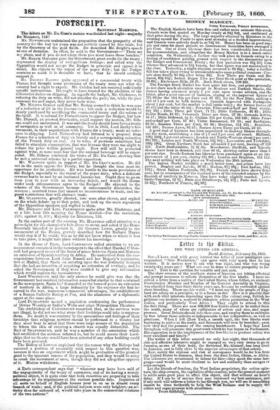Lein . fir Ehitu.
TUE WEST rums AND A3IERICA.
,North Drizton, .February 24,1860. Sut—I have read with great interest the letter of your intelligent cor- respondent "Otto Wenkstem," and agree with very much that he has written. It is useless now to ask who was right, and Who was wrong twenty-five years ago ? What can now be done to restore prosperity to Ja- maica? That is the question for sensible and justmen. The slave owners of the southern states of America -are taking effectual and prompt measures to relieve themselves of the free blacks. I have re- calved a letter from a native of the United States, whose father„an eminent Presbyterian Minister andllember of the General Assembly in Virginia, was expelled from that State thirty years ago, because he contended against slave breeding. These are his words : "I must say that the people of Eng- land are asleep on a.precipice, or in a-house on fire. 'How is it possible that with such vital interests depending upon this (the cotton) crop, British le- gislators can hesitate a moment to stimulate cotton production in the West Indies, and particularly West Africa ? They ought to attend to this the first thing. There are now 300,000 free blacks about to be exiled from the south, many of whom are cultivators of cotton and rice, and sugar growers. Great Britain should take these wen, and employ them to cultivate by free labour those articles so indispensable to her independence, as well as greatness. When I left (Nevi York, a month age), the free blacks were beginning to arrive at the north, and thousands will soon be banished ; even now they feel the pressure of the coming banishment. I hope that Lord Brougham will prosecute this great work which he has begun in Parliament. His suggestion as to the employment of the free blacks to produce cotton was most excellent and timely."
The writer of this letter assured me only last night, that thousands of able and effective labourers might be engaged on very easy terms to go to Jamaica, as one of their body, the Reverend Mr. Garnett, has long lived in Jamaica, and is fully alive to the superior advantages of that colony. Now, surely the expense and risk of conveyance would be far less from the 'United States to Jamaica, than from the East Indies, China, or Africa. The labourers are accustomed to labour for hire—they speak the same lan- guage—and would be more obedient to law and authority than savages or semi-savages.
Let the friends of freedom, the West Indian proprietors, the cotton. spin- ners, the ship-owners, the capitalists of the country, seize the present moment to settle some good plan to effect this object, and that without an hour's delay. If I can be of service they may command may best assistance, and if any such will address a letter to me Sirough you see will see if something cannot be done forthwith to help the West Indians and to supply the cotton and sugargrowers with abundance.


























 Previous page
Previous page